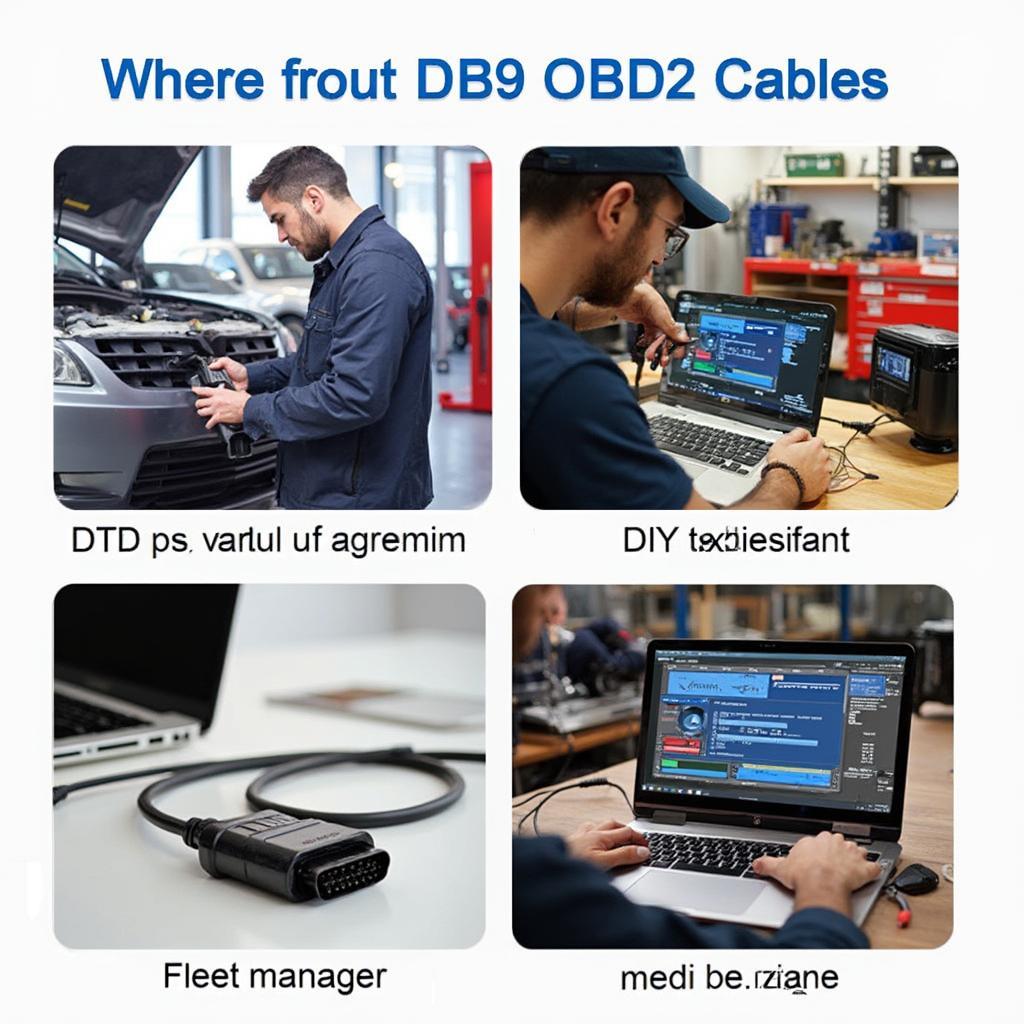The DB9 OBD2 cable acts as a bridge between your vehicle’s onboard diagnostic system and your diagnostic tools, opening up a world of information about your car’s health and performance. But with so many options available, understanding what a DB9 OBD2 cable is and how to choose the right one can be challenging. This comprehensive guide will delve into the world of DB9 OBD2 cables, exploring their functionality, applications, and key factors to consider when selecting one for your needs.
Demystifying the DB9 OBD2 Cable
A DB9 OBD2 cable, simply put, is a specialized cable with a DB9 connector on one end and an OBD2 connector on the other. The DB9 connector, characterized by its 9 pins arranged in a D-shape, is a legacy interface often found on older diagnostic equipment. The OBD2 connector, on the other hand, is the standardized 16-pin interface found in most vehicles manufactured after 1996.
The primary function of a DB9 OBD2 cable is to facilitate communication between your vehicle’s OBD2 port and diagnostic tools that utilize a DB9 interface. This connection allows you to access and interpret the wealth of data stored within your car’s onboard computer, enabling you to:
- Retrieve and clear Diagnostic Trouble Codes (DTCs)
- Monitor engine parameters like RPM, speed, and coolant temperature
- Analyze sensor data for troubleshooting issues
- Perform emissions testing
- And much more
Choosing the Right DB9 OBD2 Cable
Selecting the appropriate DB9 OBD2 cable is crucial for successful vehicle diagnostics. Here’s what you need to consider:
- Compatibility: Ensure the cable is compatible with both your vehicle’s OBD2 protocol and your diagnostic tool’s DB9 interface.
- Cable Length: Choose a cable length that provides sufficient reach for your working environment.
- Build Quality: Opt for cables with durable construction, high-quality connectors, and proper shielding to ensure reliable performance and longevity.
For those looking to clear their engine light, understanding how to use an OBD2 scanner can be invaluable. You can learn more about this process in our dedicated guide: clear engine light obd2.
Applications of DB9 OBD2 Cables
DB9 OBD2 cables find applications in various automotive scenarios, including:
- Professional Vehicle Diagnostics: Mechanics and technicians rely on these cables to connect older diagnostic equipment to newer vehicles, ensuring comprehensive diagnostics for a wide range of car models.
- DIY Enthusiasts: For car enthusiasts who prefer hands-on diagnostics using older tools or specialized software, DB9 OBD2 cables provide the necessary interface.
- Fleet Management: Companies managing fleets of vehicles can utilize these cables with their existing diagnostic setups, enabling efficient maintenance and troubleshooting.
Tips for Using DB9 OBD2 Cables
- Always ensure your vehicle’s ignition is switched off before connecting or disconnecting the cable.
- Handle the cable with care to avoid damaging the connectors or internal wiring.
- Store the cable in a clean, dry place when not in use to prevent corrosion or damage.
 Various Applications of DB9 OBD2 Cables in Automotive Settings
Various Applications of DB9 OBD2 Cables in Automotive Settings
Conclusion
A DB9 OBD2 cable serves as an essential tool for accessing your vehicle’s diagnostic system, bridging the gap between legacy diagnostic interfaces and modern OBD2 technology. Understanding its functionality, selecting the right cable, and using it correctly can empower you to perform a wide range of diagnostic tasks, from simple code reading to advanced troubleshooting.
If you’re looking for a reliable and user-friendly OBD2 scanner, be sure to check out our selection of top-rated models. For information on connecting a Wi-Fi OBD2 scanner, our guide provides step-by-step instructions: how to connect to a wi-fi obd2.
Remember: “Taking care of your car starts with understanding its language. A DB9 OBD2 cable provides the key to unlocking valuable insights into your vehicle’s health.” – David Miller, Senior Automotive Engineer
FAQs
1. Can I use any DB9 cable for OBD2 diagnostics?
No, not all DB9 cables are compatible with OBD2 systems. You need a dedicated DB9 OBD2 cable designed for this specific purpose.
2. What are the common OBD2 protocols supported by DB9 OBD2 cables?
Most cables support common protocols like ISO 9141-2, KWP 2000, and CAN bus. However, it’s crucial to check compatibility with your vehicle and diagnostic tool.
3. What if my diagnostic tool doesn’t have a DB9 port?
You’ll need a suitable adapter or converter to connect your diagnostic tool to a DB9 OBD2 cable.
4. Are there wireless alternatives to DB9 OBD2 cables?
Yes, Bluetooth and Wi-Fi OBD2 adapters offer wireless connectivity for increased convenience.
5. Can a DB9 OBD2 cable damage my vehicle’s computer?
Using a compatible cable correctly poses minimal risk. However, using an incompatible cable or connecting it incorrectly can potentially cause damage.
Need help with your OBD2 scanner? Contact our support team via WhatsApp: +1(641)206-8880 or email us at [email protected]. We’re available 24/7 to assist you.